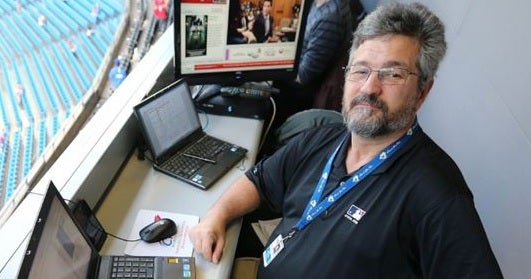No cheering allowed: Blue Jays official scorer hails from Waterloo

Utter, a research support technologist at the University of Waterloo, marks four slashes in the digital box score on his tablet, updates a spreadsheet on his laptop and takes a second look at the video replay screen to his right.
As an official scorer for Major League Baseball, he has the final say on all plays from his perch up in the press box.
That means nothing is official — from home runs to hits to errors to sacrifice bunts — until he records it.
That leaves no room for cheering, either. "I haven't been able to cheer for 26 years," he said. "It's become second-nature not to cheer. Even if I'm not working and watching the game on TV at someone's house, I have a hard time cheering."
Utter has been recording statistics from the press box at Blue Jays games since 1990, way back when his day job was at Lulu's Roadhouse in Kitchener.
Back then, he was working part-time for Stats Inc. and recording detailed information on every at-bat. He's been an official scorer for Major League Baseball since 2006, and does about 50 games a year for the league and Stats Inc.
In that time, he's covered World Series games, an epic Canada vs. U.S. clash in the World Baseball Classic and the 1991 All-Star Game, and hundreds of other games, some not quite a as memorable.
But now, after a 22-year Blue Jays playoff drought, Utter says he's excited to finally be going back to the post-season — not that he's allowed to show his glee.
While he may be all business when he's working, he knows he's lucky to get paid to watch baseball. Never mind all the free popcorn he can handle.
"I have a job that only four people in Canada have," he said. "You don't do it for the money, but I get a great seat and I get to watch baseball. And I get to be the boss."
Raised on a farm in Stoney Creek, Utter moved to Waterloo Region in 1980 when he went to university and relocated to Waterloo from Cambridge about four years ago. He says he wasn't a baseball nut growing up, although he did play slo-pitch.
But he's got a head for numbers and loves the nuances of scoring baseball — a game where judging a player's "ordinary effort" can mean the difference between a hit for a batter or an error for the fielder.
From his seat in the press box, Utter keeps an eye on all activity in the game. A digital stopwatch records the time between first pitch and the final out. Another smartphone is perched nearby, ready to record the length of video review delays.
A pair of binoculars are there in case he needs to double-check the number of a player coming out of the bullpen, or an out-of-position fielder who's made a play. There's a microphone for announcing calls, a starter's final pitching line, the game's attendance or box score totals, carried by speakers throughout the press box and broadcasters' booths.
In rare cases, he needs to refer to the thick, coil-bound Major League Baseball rule book, which is always within reach. But that can delay calls, and leave him open for criticism from the radio and TV guys if he ends up contradicting their own version of events, he said.
While most other official scorers still fill out their final report by hand, he's developed a completely digital system. His colour-coded box score relies on his own shorthand language to describe the complex script of the game's events, and saves him time, too.
At the end of every game, he emails a PDF to Elias Sports Bureau in New York, the league's official statistics firm, and prints out copies with a portable printer to compare his record with the guys from MLB.com.
No other sport has a job quite like an official scorer, so Utter says he's forgiving when some people don't fully understand what he does.
"The biggest misconception is that I run the scoreboard at the Rogers Centre," he said. "I don't do that."
There is pressure to get calls right, of course.
But Utter has been doing this so long he's learned to trust his instincts on tough calls, even if he occasionally gets asked by some teams, and even play-by-play broadcasters, to take a second look.
Players and their agents can also formally protest his calls, too, and Utter has 24 hours after the end of a game to change his mind, which does happen every now and then.
Some marquee players — he asked they not be named — have a reputation for appealing calls more than others, particularly when they're in a contract year and using their personal stats as leverage in multi-million-dollar negotiations.
But Utter boasts that he only had one call overturned last season.
He's free to ask others for their opinion, but he's not supposed to be influenced in his decisions, and can't listen to broadcasts during the game.
And he's not supposed to show any home-team sympathies, either, even if Edwin Encarnacion just hit his third home run of the game.
The league takes its no-cheering policy seriously. When he was the official scorer for a game on Canada Day a few years ago, Utter made the mistake of wearing a red baseball jersey with logo from "The Incredibles" movie on it — and was reprimanded for it.
Utter loves that he'll forever be connected to Major League Baseball, in a way few of us ever will.
"I'm a part of baseball. I'm not just a spectator of the game. What I say matters. What I say counts," he said. "And I didn't have to spend years in the minor leagues to get here."
gmercer@therecord.com , Twitter: @MercerRecord